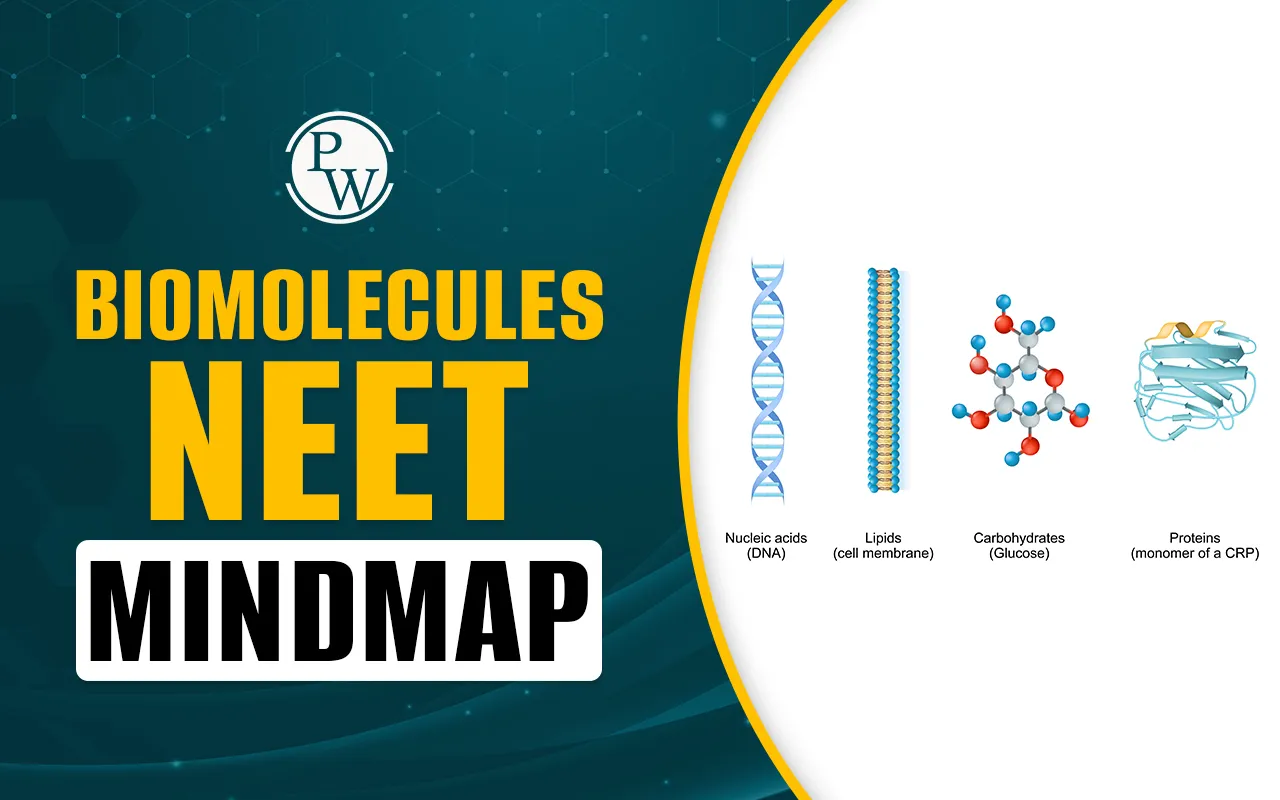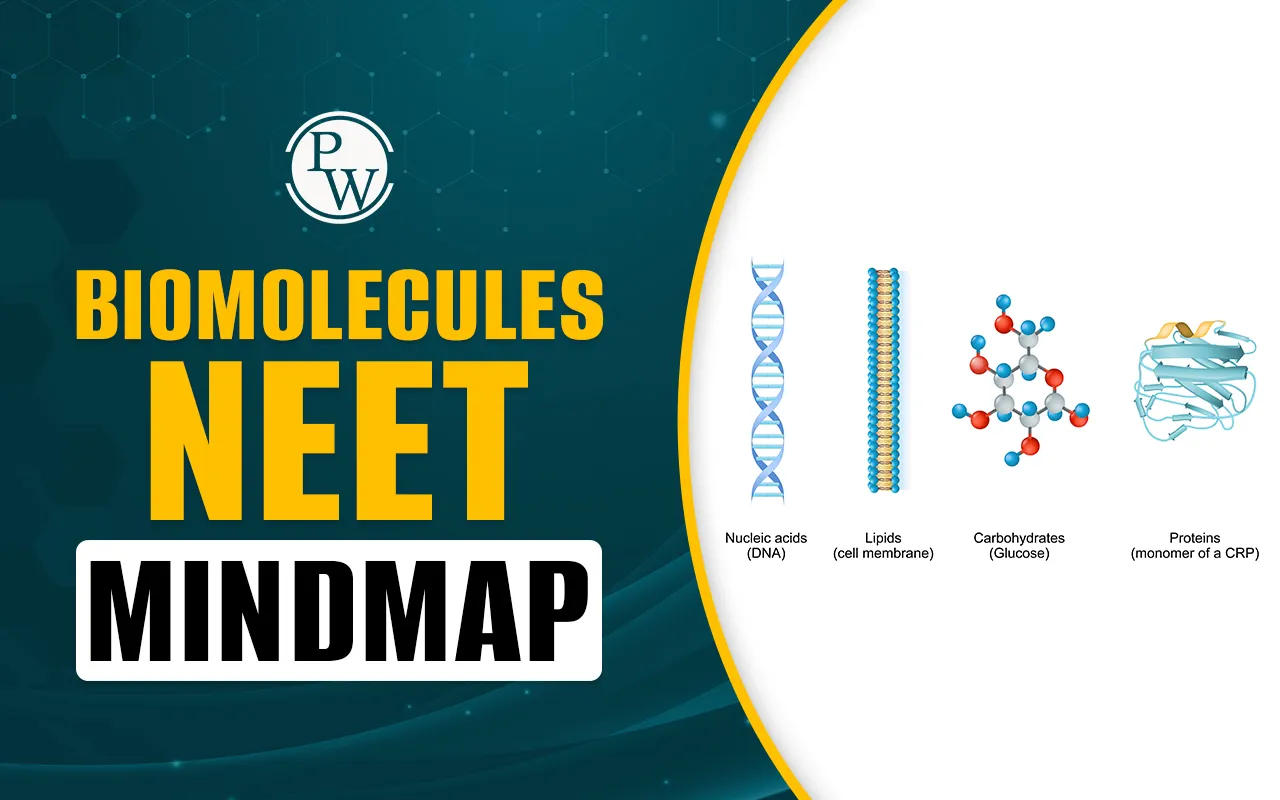

Biomolecules NEET Mindmap is a smart and simple visual tool that helps NEET aspirants understand the chemical compounds that make up living organisms. This topic is very important in NEET Biology because it explains how these biomolecules work together to support life. Biomolecules are comprised of carbohydrates, proteins, lipids, nucleic acids, enzymes, and vitamins. They play critical roles in cell structure, function, and metabolism, and PW’s NEET Mindmap will allow students to memorize their types, examples, and functions within a single look.
Physics Wallah (PW) also offers concise NEET Biology notes, important questions, and downloadable PDF mindmaps to help students revise quickly, absorb concepts visually, and retain information for a longer period. This is a tried and tested last-minute revision hack before the final NEET exams.
Biomolecules NEET Mindmap
Biomolecules NEET Mindmap by PW elucidates all the crucial chemical compounds that are present within living cells. These comprise carbohydrates, proteins, lipids, nucleic acids, enzymes, and vitamins. All these categories of biomolecules distinctly serve a range of purposes that help in growth, repair, and reproduction of organisms.
For instance, carbohydrates provide immediate energy, proteins assist in bodybuilding and enzyme activity, lipids store energy, nucleic acids carry genetic information, enzymes catalyze chemical reactions, and vitamins are required to support various essential body functions.
PW’s NEET Mindmap beautifully and uniquely interconnects all the above topics in a single illustrative and informative diagram that students can easily create on their own or follow online. Arrows, keywords, and even color codes have been smartly used to represent and highlight interactions of these chemical compounds with one another inside a living cell.
PW’s Biomolecules NEET Mindmap also entirely depends on NCERT curriculum and contains only those questions and study points that are necessary to be covered for NEET exam preparation. The best part about PW’s study materials is that it simplifies complex biochemical equations and reactions and makes it easier for aspirants to memorize and revise them.
Students can cross-reference this NEET Mindmap with PW’s NEET Physics notes or important question set for simultaneous coverage of both the subjects.
Biomolecules NEET Mindmap PDF
PW provides a free downloadable Biomolecules NEET Mindmap PDF that comprehensively includes all the important topics and diagrams presented in the NCERT chapter. The PDF features well-organized visuals for carbohydrates, proteins, lipids, nucleic acids, enzymes, and vitamins – all in one place – to make it a wholesome revision tool
PW’s Biomolecules NEET Mindmap PDF aids students in summarizing and visualizing all the above points at a glance. Concise and well-organized, the content follows an exam-based approach, which is the reason most NEET aspirants use PW’s mindmaps and notes for their last-minute preparations.
Download Biomolecules NEET Mindmap PDF
Tricks to Learn Biomolecules NEET Mindmap
Biomolecules, at first, can seem like an overwhelming topic for students to learn as it has so many different types and complex chemical reactions. However, with the help of smart little tricks, one can make it extremely simple and easy to memorize. As a matter of fact, the NEET Biomolecules mindmap by PW smartly uses visual memory tricks that enable aspirants to recollect the information quickly and in a shorter span of time.
-
Carbohydrates: Energy Source: Remember CHO for carbohydrates since it is made of carbon, hydrogen, and oxygen. Glucose is the energy source that provides quick energy and starch is stored energy in plants.
-
Proteins: Amino Acid Chain: Proteins are made up of long chains of amino acids which help in muscle building and enzyme action. Examples: Keratin, hemoglobin, enzymes, etc.
-
Lipids: Energy Storage Molecules: They can be remembered as the energy storage bank. Moreover, they are also used for organ protection and making up of membranes.
-
Nucleic Acids: DNA and RNA: DNA is the genetic material that stores the information and RNA is the protein synthesis manager. The mindmap diagram depicts the nucleotides that are the building blocks of DNA and RNA.
-
Enzymes: Speed up Chemical Reactions: It is a biological catalyst and the mindmap illustrates the lock and key model to understand the enzyme-substrate fit.
-
Vitamins: Micro Nutrients: They are organic compounds, that are required in minute quantity by the body and perform big roles, such as immunity boost and better metabolism. Example: Vitamin D makes our bones strong and vitamin C heals us.
-
Mindmap is all about Linking: Link every molecule with its function using arrow heads or color coding. Do this for the entire Biomolecules NEET Mindmap diagram. This will help you recall every information about biomolecules during the NEET exams at the top of your head.
Why Biomolecules NEET Mindmap is Important
Biomolecules NEET Mindmap is a significant and vital study tool that helps in understanding the way life functions on a molecular scale. It bridges the gap between chemistry and biology by simplifying the interaction between molecules present within the cells. In fact, questions on carbohydrates, enzymes, nucleic acids, and other such topics are asked frequently in the NEET exam.
If students constantly revise the mindmap, they can easily revise the entire chapter within a few minutes. NEET aspirants can also enhance long-term memory and accuracy in solving objective type questions by using the mindmap.
PW’s NEET Mindmaps are meticulously crafted using NCERT-centric content along with pictures and infographics that not only improves concept clarity but also remains close to the exam pattern and approach. Aspirants can also use this mindmap with the help of PW’s NEET Physics notes and important question sets to strike a balance between their preparation.
Prepare for NEET 2026 with Arjuna NEET 3.0, Lakshya NEET 3.0, and Yakeen NEET 3.0 online batches. These courses provide clear lessons and regular practice tests to help you cover the entire syllabus step-by-step.
Also Check:
- JEE Main Registration 2026
- JEE Main 2026 Cutoff Prediction
- JEE Main Exam Pattern 2026
- JEE Main Eligibility Criteria 2026
- JEE Main 2026 Admit Card
